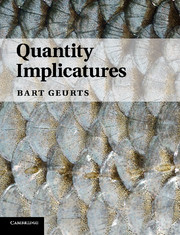Book contents
- Frontmatter
- Contents
- Preface
- Introduction
- 1 Gricean pragmatics
- 2 The Standard Recipe for Q-implicatures
- 3 Scalar implicatures
- 4 Psychological plausibility
- 5 Nonce inferences or defaults?
- 6 Intentions, alternatives, and free choice
- 7 Embedded implicatures: the problems
- 8 Embedded implicatures: a Gricean approach
- Afterword
- Notation and abbreviations
- References
- Index
7 - Embedded implicatures: the problems
Published online by Cambridge University Press: 04 February 2011
- Frontmatter
- Contents
- Preface
- Introduction
- 1 Gricean pragmatics
- 2 The Standard Recipe for Q-implicatures
- 3 Scalar implicatures
- 4 Psychological plausibility
- 5 Nonce inferences or defaults?
- 6 Intentions, alternatives, and free choice
- 7 Embedded implicatures: the problems
- 8 Embedded implicatures: a Gricean approach
- Afterword
- Notation and abbreviations
- References
- Index
Summary
Even before the William James Lectures had started appearing in print, Grice's critics were arguing against his theory of conversational implicature using examples in which, prima facie, conversational implicatures occurred within the scope of conditionals and other operators; which on a Gricean view amounts to a contradiction in terms, since conversational implicatures can only be derived on the basis of a full-blown speech act. The first author to raise this issue was Cohen (1971), who presented cases like the following:
(1) If the old king has died of a heart attack and a republic has been declared, then Tom will be quite content.
Cohen observed that (1) may be understood as:
(2) If the old king has died of a heart attack and afterwards a republic has been declared, then Tom will be quite content.
If it is assumed that, within the Gricean scheme of things, the sequential reading of “and” is due to a Manner implicature, this interpretation is problematic, because it would seem to require that the implicature must be derived within the antecedent of the conditional; which is simply impossible (see Carston 2002 for extensive discussion of the pragmatics of conjunction). Hence, Cohen concluded, we have to accept that, in sentences like (1), the truth-conditional meaning of the word “and” has a temporal component.
Information
- Type
- Chapter
- Information
- Quantity Implicatures , pp. 133 - 164Publisher: Cambridge University PressPrint publication year: 2010
